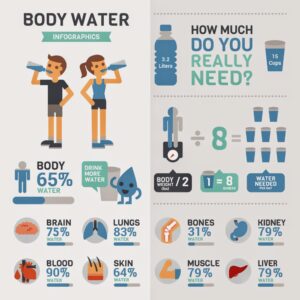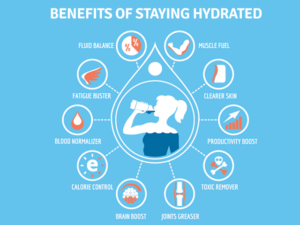Drinking water is vital to life, but sometimes we don’t have enough of it. Why do we need to drink so much water, and how can we make sure that we are getting enough?
Water is necessary to keep our bodies healthy. It helps our joints, bones, and teeth stay strong and carries oxygen in our blood to ensure our cells are working.1 Consuming enough water ensures that we are not only staying physically healthy but mentally as well. It aids our sleep, memory, and mood.2
Low water intake leads to dehydration which is dangerous for teenagers. Some of the causes include vomiting, diarrhea, and loss of appetite due to gastrointestinal illnesses. Physical activities such as sports might cause dehydration if the body is not being replenished with fluids lost from sweating.
A person who is dehydrated might feel thirsty, feel dizzy and lightheaded, have a dry or sticky mouth, urinate and sweat less, and have dark-colored urine.3 More serious symptoms might be having dry skin, rapid heartbeat or breathing, and sunken eyes. Since these are signs of severe dehydration, it might be necessary to see a doctor or go to the emergency room right away.4
The amount of water that you should have varies depending on factors like exercise, climate, and your health. For days when the climate is pleasant and you are well, about 15.5 cups of water is healthy for men and 11.5 cups for women.5 It is hard to measure this out exactly, so aiming for about 8 glasses of water is safe. However, note that this number can change depending on sweating due to hot weather or strenuous exercises. The water intake number changes slightly for children as 5-8 year olds should have about 5 cups of water, 9-12 year olds should have about 7 cups of water, and 13+ year olds should have about 8 cups of water.6
Drinking plain water is not the only option to keep hydrated. Many foods and beverages have a percentage of water contained in them. This includes coconut water, soups, melons and cucumbers, smoothies, unsweetened iced tea, and milk. Sports drinks with electrolytes and carbohydrates are popular because they help you to perform well and concentrate for long periods of time.7 While this should not be a total substitute for water, in cases of intermittent or prolonged durations of exercise, these sports drinks can be beneficial. Each one of these alternatives has its own benefits like extra minerals, nutrients, and vitamins.8 Remember if you want to stay healthy and well, drinking enough water is swell!
- Choose water for healthy hydration. HealthyChildren.org. (2020, January 27). Retrieved from https://www.healthychildren.
org/English/healthy-living/ nutrition/Pages/Choose-Water- for-Healthy-Hydration.aspx - Harvard T.H. Chan School of Public Health. (2018, June 22). The importance of Hydration. Retrieved from https://www.hsph.harvard.edu/
news/hsph-in-the-news/the- importance-of-hydration/ - Solo-Josephson, P. (Ed.). (2017, June). Dehydration (for teens) – Nemours Kidshealth. KidsHealth. Retrieved from https://kidshealth.org/en/
teens/dehydration.html - WebMD Editorial Contributors. (2021, May 20). Dehydration – signs, symptoms, causes, and prevention. Retrieved from https://www.webmd.com/a-to-z-
guides/dehydration-adults - Mayo Foundation for Medical Education and Research. (2022, October 12). How much water do you need to stay healthy? Mayo Clinic. Retrieved from https://www.mayoclinic.org/
healthy-lifestyle/nutrition- and-healthy-eating/in-depth/ water/art-20044256 - Healthdirect Australia. (2022, June 20). Hydration tips for children. healthdirect. Retrieved from https://www.healthdirect.gov.
au/hydration-tips-for-children - Tinsley, G. (2018, May 13). Sports drinks: Should you drink them instead of water? Healthline. Retrieved from https://www.healthline.com/
nutrition/sports-drinks# athletes - Wartenberg, L. (2021, June 29). What to eat when dehydrated: 7 helpful foods and drinks. Healthline. Retrieved from https://www.healthline.com/
nutrition/what-to-eat-when- dehydrated






